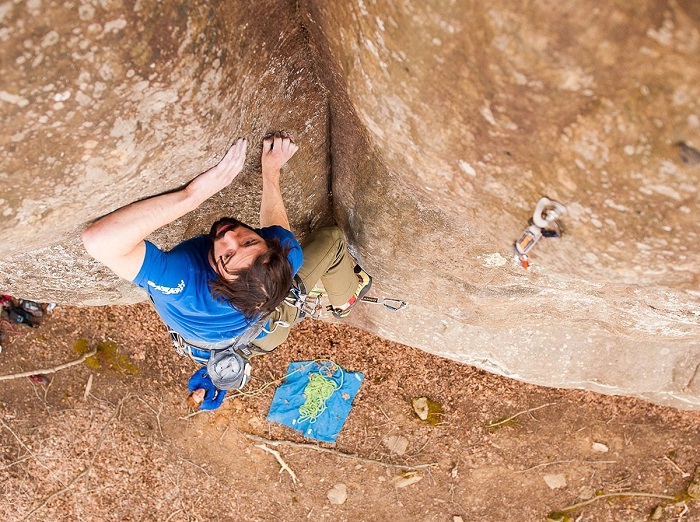Missouri’s parks and public land provide welcoming playgrounds for outdoor enthusiasts of all kinds. Mountain biking trails wind through some; anglers cast their lines at others; and climbers take to the state parks with taller, rockier terrain — four of them at least. Thanks to the efforts of climbing advocates like the BETA Fund, that number could go up.
The BETA Fund is a not-for-profit organization that works in partnership with local and national climbing organizations, private landowners, public land managers, governmental agencies and individual volunteers to conserve and preserve access to outdoor climbing areas in the Midwest.
“We’re trying to create a culture of responsible climbing in Missouri,” said Kevin McCarthy, one of eight BETA Fund board members. “Even though rock climbing has been around for a really long time, it does tend to get overlooked.”
In 2017, climbers showed up to a Missouri Department of Conservation (MDC) public forum in such mass that they could not be overlooked. Many urged MDC to consider expanding public climbing access, specifically at Rockwoods Reservation, a state forest and wildlife conservation area in St. Louis County. Following the forum, the BETA Fund petitioned policymakers and coordinated letter-writing campaigns further imploring MDC to address rock climbing in its official Wildlife Code of Missouri.
The BETA Fund has made more headway than anyone else
“The BETA Fund has made more headway than anyone else,” said Jon Richard, owner of Vertical Voyages, a St. Louis-based rock and tree climbing guide service.
“While the BETA Fund has been working toward expanding outdoor rock-climbing areas, Vertical Voyages has been partnering with MDC to open up climbing in trees as a means for forest ecology awareness,” Richard continued. “What was once ‘never going to happen’ is now considered adventure education and conservation advocacy.”
The BETA Fund believes that the same consideration can be made for rock climbing.
In 2018, the BETA Fund assisted Missouri State Parks in evaluating the four parks that currently allow climbing: Elephant Rocks State Park, Johnson’s Shut-Ins State Park, Lake of the Ozarks State Park and St. Francois State Park. Volunteers and park staff identified each park’s basic amenities (bathrooms, trails, trash receptacles, campsites, parking) as well as climbing-specific details (existing routes, number of bolts, anchoring systems, belay stations).
“In terms of climbing and bouldering, they simply didn’t know what they had,” McCarthy said.
Following the evaluations, the BETA Fund and Missouri State Parks signed a Memorandum of Understanding, a move McCarthy says is the first of its kind for a non-profit climbing organization. In addition to inviting climbers to be engaged with rules, regulations, safety and access related to climbing in Missouri State Parks, it also permits the BETA Fund to bolt, fundraise, and host volunteer and educational activities within the state parks system.
The BETA Fund’s advocacy efforts at the policy level continue to show promise. But McCarthy says improving climbing access is a long-term commitment, requiring time and resources and patience. He implores climbers to support BETA Fund efforts by getting involved in the areas they recreate.
“The agencies we’re working with respond to seeing user groups giving back and improving natural habitats,” McCarthy said. “They have mandates to conserve and preserve natural and cultural resources. That’s why it’s so important to show up and care about the resources we’re using.”
REI Grant for Jackson Falls
In addition to its advocacy efforts in Missouri, the BETA Fund arguably has had an even greater impact on Illinois climbing.
Nestled in the Shawnee National Forest, Jackson Falls is Southern Illinois’ largest sport-climbing destination. Each year, a growing number of recreational outdoor climbers scales its 400+ routes. Consequently, the parking, trails, campsites and climbing areas at Jackson Falls need repair, updating and expanding to accommodate their increased use.
In 2018, the REI Foundation awarded a $15,000 grant to the BETA Fund to address these concerns. According to its website, REI supports more than 300 nonprofits that reduce barriers to life outside and positively shape their communities.

The BETA Fund preserves access to climbing areas in the Midwest
“Our goal at the BETA Fund is to improve climbing access, which falls in line with the mission of the REI Foundation’s grant program,” said David Chancellor, owner of the St. Louis-based indoor rock-climbing gym Climb So iLL and a BETA Fund board member. “The grant is a huge win for us, and it puts a smile on my face from ear-to-ear.”
The grant will make additional restoration and conservation efforts possible. Chancellor says the focus will be on heavily traveled trails, parking improvements, way-finding signage, conservation education and additional emergency kits.
“The explosion of indoor climbing gyms has fostered more climbing outdoors. A lot of what the BETA Fund is doing proactively ensures the long-term sustainability of climbing access in the Midwest,” Chancellor said. “As a gym owner, this is the best way to give back to the community that has supported us over the years.”
Author: Corrie Hendrix Gambill is a contributor to Terrain Magazine
Images: Courtesy of Dan Brayak


[…] been a long road,” said newly elected BETA Fund President Kevin McCarthy on having rock climbing reintroduced to the property. “The conversation […]